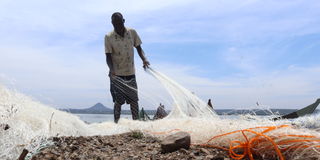Looming fish shortage due to mass deaths in Lake Victoria

Thomas Awili untangles a fishing net at Ndhuru beach in Mbita Sub-county before a fishing expedition in Lake Victoria on October 26,2022. There is hardly any catch at the moment after mass death of fish.
Fishermen in Homa Bay have warned that the economy of the county will be hurt by reduced supply of fish in Lake Victoria.
Fish in the lake have been dying in masses, with experts blaming low oxygen levels in water because of pollution.
The past two months has recorded the lowest catches in history as dead fish are washed ashore dead and probably contaminated.
Fishing is one of Homa Bay’s leading revenue earners, employing thousands of young people.
But pollution in Lake Victoria threatens the sector.
Parts of the lake waters in Rachuonyo North, Rangwe and Homa Bay sub-counties have green matter.
Sometimes the water produces a bad odour and green foam washes up on beaches.
Fishermen in the affected areas occasionally come across dead fish on at least 29 beaches that normally have calm waters.
They are now concerned that the phenomenon will have a negative economic impact, calling on experts to help.
At the Ndhuru beach in Lambwe, Mbita sub-county, fishermen have scaled down the number of days they go to the lake to fish.
This is because their nets get dirty and they have to spend some time cleaning them before getting them back in the water.
Huge drop in fisherfolk
Ndhiru Beach Management Unit chairman John Ogweno said that of the 283 fishermen registered to operate at the beach, less than 30 individuals now go to the lake to fish.
"A few who could not stand the hardship migrated to other beaches to try their luck there," he said.
Others are contemplating venturing into other economic activities like crop farming.
One of them, Mr Calvice Mingo, said he owns three boats, two of which are docked at the beach for weeks because they do not add value to him for now.
He said his colleagues who had started animal farming are equally affected as the animals cannot drink the dirty water directly from the lake.
"Now is the time for the government to drill boreholes along the lake to save us from the difficulties we are undergoing," Mr Mingo said.
Officials from the Kenya Marine and Fisheries Research Institute collected samples from affected areas.
Fishermen in Homa Bay said they need guidance on what they should do to save the fish from dying and protect their livelihood.
County Beach Management Unit chairman Edward Oremo said farmers practising aquaculture in cages are the greatest casualties.
Those who had cages in Ndhiwa and other affected beaches temporarily suspended the practice until they get assurances that the lake is safe.
Mr Oremo said fish breeding grounds have equally been affected as juvenile fish are killed.
"We will soon start to see hippos and other aquatic animals dying," he said.





